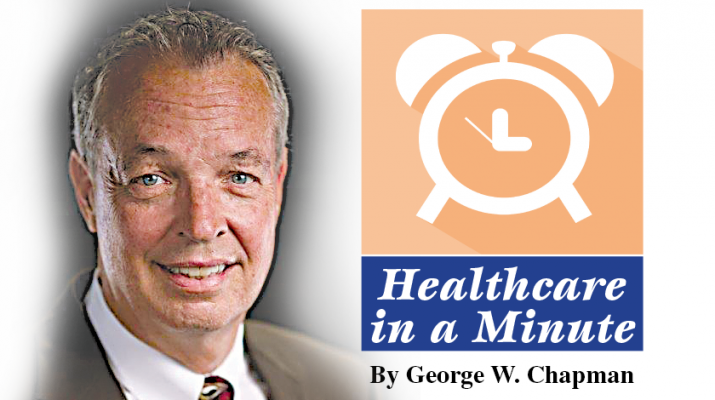By George W. Chapman
With a national election next year, the subject of healthcare dominates debates, news and talk shows. Medicare for All, universal coverage and single-payer models are being touted. The Urban Institute recently surveyed close to 10,000 people about their thoughts on healthcare. When asked about a “single payer” system, 41% responded they neither supported nor opposed the concept. But when asked about “Medicare for All,” 30% were in support and 28% opposed. (Medicare for All is a single payer system.) Forty-five percent of the respondents said they do not support or oppose a “public health option.” while 32% would support it and 21% would oppose it. The obvious problem here is healthcare is very complicated and often confusing. Consequently, the majority of Americans are ambivalent about the various models of care and are understandably fearful of change.
Best states for Healthcare
WalletHub has ranked the five states and DC, from best to worse, for healthcare. Rankings were based on a variety of factors including availability, access, cost and outcomes. The top five states beginning with No. 1 are: Minnesota, Massachusetts, Rhode Island, District of Columbia, and Vermont. The bottom five states beginning with No. 47 are: Arkansas, South Carolina, Mississippi, North Carolina and Alaska. New York ranked in the middle at No. 24. Notably, four of the top five states are in the northeast, while four of the five worst states for healthcare are in the southeast.
Telehealth growing slowly
According to a survey by J.D. Power, patient usage/acceptance of telehealth services is growing slower than envisioned. Just under 10% of those surveyed said they used telehealth in lieu of an onsite visit to a physician, urgent care center or emergency room. J.D. Power, known for rating cars, is going to set benchmarks for patient satisfaction later this year so they can measure consumer satisfaction with telehealth. Fifty-six percent of those surveyed said they would be more inclined to use telemedicine if there was some sort of ranking or satisfaction measurements. Most of those surveyed weren’t sure whether or not their insurance covered telehealth. Only 17% were sure either way. Most insurers cover telehealth, but are reluctant to “sell” it fearing over utilization of medical services. The survey produced six key findings. 1. Almost half of the respondents thought the quality of care would be diminished via telehealth. 2. Lack of awareness is most pronounced in rural areas (72%) where telehealth makes the most sense. 3. None (0%) of the patients indicating they are in poor health used telehealth. People in good or better health are more likely to use telehealth. 4. Consumers aren’t sure what it costs. 5. Consumers are split on whether telehealth is more or less as personal than an onsite visit with a provider. 6. Telehealth is used more out West (11%) than here in the East (6%).
Opioid deaths decline
For the first time in 30 years, deaths due to opioid abuse actually fell about 5% from approximately 72,000 in 2017 to approximately 68,000 in 2018. A decline in prescriptions for opioids was an obvious factor in the recent decline in deaths. Despite the decline, the number of 68,000 unnecessary deaths is still unacceptable. The CDC contributed to the decline in deaths by clarifying opioid prescribing guidelines for providers. Success varies by state. Sixteen states had more deaths in 2018 versus 2017. Two states with the worst drug problems fared far differently from each other. Missouri opioid overdoses increased 16% while New Hampshire experienced a 7% decrease in deaths.
Best NYS Hospitals
Per U.S. News and World Report, three of the top six are in New York City: Presbyterian-Columbia, Mount Sinai and Lenox Hill. Two are on long Island: St. Francis and NYU Winthrop. The sixth is Strong Memorial in Rochester.
Most common medical conditions
If you have been to your doctor’s office lately, your chief medical complaint or condition was probably from the top 10. They are in no particular order: skin disorders, stiff joints, bad back, high cholesterol, upper respiratory infection, anxiety/depression, chronic neurological disorder, high blood pressure, headaches and diabetes.
Climate Anxiety/Grief
The clinical term is “solastalgia”. Unfortunately, it is on a precipitous increase worldwide. It is defined as the distress or anxiety produced by environmental change impacting people while they are directly connected to their home environment. The American Psychiatric Association has produced a climate change guide to help physicians and mental health providers diagnosis and treat. Rising temperatures have actually led to more suicides. It is estimated that climate change contributes to 250,000 deaths per year worldwide.
Gun violence prevention
Medical professionals are speaking out, again. In the aftermath of several mass shootings, several physician associations co-authored an article in the Annals of Internal Medicine calling for immediate action to prevent gun violence. Gun violence is now acknowledged as a public health risk. The article was sponsored and written by the heads of: American College of Physicians, American Academy of Family Physicians, American Academy of Pediatrics, American College of Surgeons, American Medical Association, American Psychiatric Association and the American Public Health Association. Some of the recommendations include: enactment of “red alert” laws which allow judges to temporarily remove firearms from individuals at risk to do harm to others or themselves; requiring comprehensive criminal background checks; encourage research into the causes of gun violence and recommendations to reduce; improving access to mental health care; supporting physicians on how to advise families and at risk patients about potential gun violence and how to mitigate the risk.
George W. Chapman is a healthcare business consultant who works exclusively with physicians, hospitals and healthcare organizations. He operates GW Chapman Consulting based in Syracuse. Email him at gwc@gwchapmanconsulting.com.

